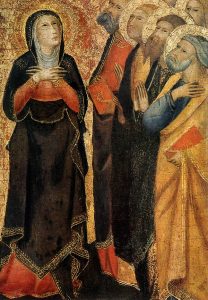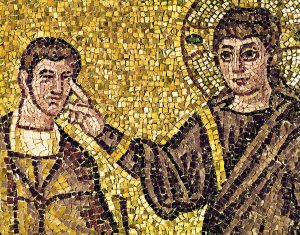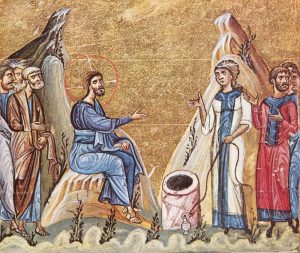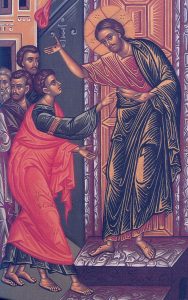Christ is Risen – Indeed He is Risen!
Christos Anesti! – Alithos Anesti!
Christos voskrese – Voistinu voskres!
Al Maseeh Qam! – Haqqan Qam!
Christus resurrexit! – Vere resurrexit!
 Sunday, 5/28/17 Seventh Sunday of Pascha, Holy Fathers of the 1st Ecumenical Council of Nicea
Sunday, 5/28/17 Seventh Sunday of Pascha, Holy Fathers of the 1st Ecumenical Council of Nicea
9:00 a.m. Special Intention
10:30 a.m. For the people of the parish
Epistle: Acts 20:16-18, 28-38
Gospel: John 17:1-13, Tone 6
Monday, 5/29/17 Venerable-Martyr Theodosia the Virgin
8:00 a.m. no intention for the Divine Liturgy
Tuesday, 5/30/17 Venerable Father Isaac, Abbot of the Dalmatin Monastery
8:00 a.m. no intention for the Divine Liturgy
Wednesday, 5/31/17 Holy Apostle Hermas; the Holy Martyr Hermes
8:00 a.m. no intention for the Divine Liturgy
Thursday, 6/01/17 Holy Martyr Justin the Philosopher and Companions
8:00 a.m. no intention for the Divine Liturgy
Friday, 6/02/17 Holy Father Nicephorus the Confessor
8:00 a.m. no intention for the Divine Liturgy
Saturday, 6/03/17 Holy Martyr Lucillianus and Companions
9:00 a.m. +Ivan & Halyna Lobay (Pan.) requested by Maria Lobay
Sunday 6/04/17 Eighth Sunday of Pascha —Holy and Glorious Pentecost
10:30 a.m. For the people of the parish
Epistle: Acts 2:1-11
Gospel: John 7:37-52; 8:12, Tone 7

 The theme of baptism continues in this Sunday’s Gospel, re-affirming that Pascha is a feast of resurrection and of baptism, being born into eternal life. The center of Jesus’ conversation with this unnamed woman (the Church later gave her the name Photine, the “enlightened woman”) is about water. They met at Jacob’s well, a place of great tradition, a sign and a promise of God’s love and mercy for his people. Jacob’s well provided the riches of water to a desert place, the sign that God would always provide for and bless his people. However, the encounter with the woman reveals something more: Jesus is the Messiah to come, he is greater than the Patriarch Jacob. The water of Jacob’s well is only for this world, Jesus would give “the water that would become a spring of water welling up to eternal life. (John 4:14)” This clearly refers to our baptisms, as it comes immediately after the comparison of Jesus with John the Baptist, and the baptisms done by Jesus’ disciples.
The theme of baptism continues in this Sunday’s Gospel, re-affirming that Pascha is a feast of resurrection and of baptism, being born into eternal life. The center of Jesus’ conversation with this unnamed woman (the Church later gave her the name Photine, the “enlightened woman”) is about water. They met at Jacob’s well, a place of great tradition, a sign and a promise of God’s love and mercy for his people. Jacob’s well provided the riches of water to a desert place, the sign that God would always provide for and bless his people. However, the encounter with the woman reveals something more: Jesus is the Messiah to come, he is greater than the Patriarch Jacob. The water of Jacob’s well is only for this world, Jesus would give “the water that would become a spring of water welling up to eternal life. (John 4:14)” This clearly refers to our baptisms, as it comes immediately after the comparison of Jesus with John the Baptist, and the baptisms done by Jesus’ disciples. Today is the eighth day of the celebration of the eighth day. Pascha! The Resurrection of our Lord! The Feast of Feasts!
Today is the eighth day of the celebration of the eighth day. Pascha! The Resurrection of our Lord! The Feast of Feasts!